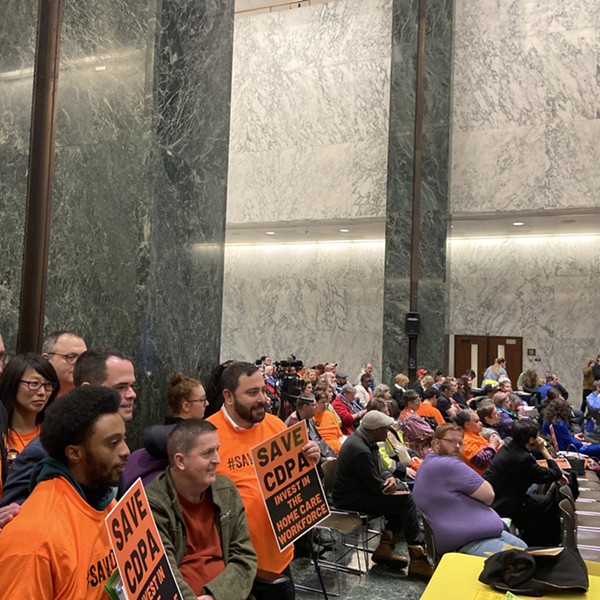Larry Beinhart’s Body Politic: November 2011
[]
How would you like to earn an extra $5,000 a year? Not just this year. Every year.
For how long? For life, the rest of your working life.
Think about your retirement. Do you want a pension? Would you like the money that you worked for to actually be there when the time comes?
What about Social Security, Medicare, and Medicaid? You’ve been paying in, you have a right to have those investments pay off.
It’s a whole lot simpler and easier than you might expect. You want to know how easy? Just live in a state where there are unions.
You don’t have to belong to one. You don’t have to support them. All you have to do is have union members as your neighbors. When you do, the median income in your state—which presumably means your income, plus or minus—will be $5,000 more a year, every year, than someone who lives in one of those Rip Me Off States. (Yes, in common parlance they’re called Right to Work States, but like so much of our casual rhetoric, that’s sadly misleading. You have a right to work in every state. If you work for a company that has a union contract in a don’t-rip-me-off state, you have to pay union dues. That is, you have to pay for the services they perform. In a rip-me-off state you’re free to be a freeloader. Which, since you’re making $5,000 less than you should be making, you might need to do.)
It’s not just your pay scale and your personal benefits. The whole social contract takes a hit when unions are weak. In Rip Me Off States, an additional 21 percent don’t have health care, primary and secondary schools get about $1,700 less per student, and the poverty rate is 2.3 percent higher.
When unions go away, people die. Infant mortality is 17 percent higher. The rate of workplace deaths is 51 percent higher.
Most readers of this column already live in don’t-rip-me-off states. So you might think this issue doesn’t matter to you. Plus, you’re pissed at me because I didn’t show you how to make another five grand a year over and above the five grand a year more that you’re already making because of the unions.
If I’ve failed you on the greed side, let me hit you with fear!
Take away the unions—even if you’re not in one—and wages, salaries, health care, and pensions will go down. Your New York, Massachusetts, and Connecticut pay will start sliding south to Arkansas numbers.
Unions are the sole, institutionalized counterweight to corporate interests on economic issues. They were significant players in the creation of Social Security and in saving it when it’s been under assault. They were crucial to the passage of Medicare, Medicaid, and civil rights legislation.
Back around 1970, America’s corporate interests, business leaders, and the political right got together—formally and informally—and decided to put a stop to unions in the private sector. And by gosh, they did. With Jimmy Carter in the White House and Democrats in control of the House and Senate, everyone expected new pro-labor legislation. Big Money had all the Republicans, they got some Democrats, and they stopped things cold.
Carter began deregulation in airlines, trucking, and the telephone company. This introduced competition to theses business sectors (a good thing, innovation and cheaper prices). It also brought competition to the workers. The new start-ups were often nonunion (yes, boss, I’ll do it cheaper, with fewer work rules, without health care or pensions), which pushed everyone’s wages and benefits down.
Then came Reagan. There had been an informal social contract that if workers went on strike they would not be fired and would return after an agreement was reached. The air traffic controllers went on strike. Reagan fired them. And replaced them with new people. A new trend had been established. It swept the nation. The strike was no longer a viable weapon. The strike was dead. From a history of labor unions by Gerald Friedman at EH.net, the home of the Economic History Association: “By the early 1980s, union avoidance had become an industry. Anti-union consultants and lawyers openly counseled employers how to use labor law to evade unions. Unfair labor practices in violation of the Wagner Act tripled in the 1970s. Over 10,000 workers a year were illegally discharged for union activity. By the 1990s, the unionization rate in the United States fell to under 14 percent, including only 9 percent of the private sector workers” (http://eh.net/encyclopedia/article/friedman.unions.us).
About 36 percent of public sectors workers are in unions. Do you want public sector workers to be unionized? It’s in the vital self-interest of public-sector workers to support public services—to fight for clean water, sanitation, safety measures, police, education, public health, and a host of other things that allow society to function and that keep your world working safely and efficiently.
If it were up to the rich and radical right, everything would be privatized. People with lots of money would retreat to gated communities, happy to leave all the rest to rack and ruin. If you if you think that’s an exaggeration, take a look at the result of white flight from the inner cities in the seventies and the retreat from all but the wealthiest communities today after the collapse of the housing bubble.
Unions support the social contract. They also, usually, support the Democratic Party. For both reasons, the Republicans, the big corporations, and the Radical Right are out to destroy them. Their strategy: Paint city sanitation workers and aides in public hospitals as overpaid, pampered leeches who get all kinds of benefits—health care and pensions, sick days, and grievance hearings—that private sector workers don’t get. So you should be furious, and instead of fighting for those benefits for yourself, you should take them away from teachers and firefighters!
Astonishingly, they have had some major successes.
Public service unions were born in Wisconsin. They have just been effectively abolished. The right to have public service unions in Ohio has effectively been abolished.
People are fighting back in both places. In Ohio a referendum may reverse the law. In Wisconsin, they are trying to recall the governor. But even if he’s replaced, pro-labor candidates have to take back the state senate and 11 seats in the house.
But enough about the poor hardworking folks of the Midwest. This column is about you, your greed (and mine), and your fears (and mine).
If the unions die, the 1 percent, the Wall Street hustlers and con men, the radical right and the Republican loons, are that much closer to taking it all. Driving your salary down to increase corporate profits, looting your pension, and cutting your benefits. If they get hold of Social Security, they’ll turn it over to big banks and hedge funds. If they get hold of Medicare, they’ll it turn it over to private insurers and Big Pharma.
Support unions. They support you. (You may not have known that before, but you know it now.)

















